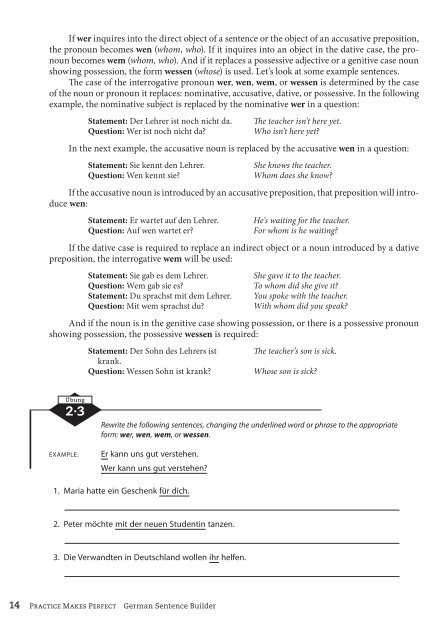german_sentence_builder
You also want an ePaper? Increase the reach of your titles
YUMPU automatically turns print PDFs into web optimized ePapers that Google loves.
If wer inquires into the direct object of a <strong>sentence</strong> or the object of an accusative preposition,<br />
the pronoun becomes wen (whom, who). If it inquires into an object in the dative case, the pronoun<br />
becomes wem (whom, who). And if it replaces a possessive adjective or a genitive case noun<br />
showing possession, the form wessen (whose) is used. Let’s look at some example <strong>sentence</strong>s.<br />
The case of the interrogative pronoun wer, wen, wem, or wessen is determined by the case<br />
of the noun or pronoun it replaces: nominative, accusative, dative, or possessive. In the following<br />
example, the nominative subject is replaced by the nominative wer in a question:<br />
Statement: Der Lehrer ist noch nicht da.<br />
Question: Wer ist noch nicht da?<br />
The teacher isn’t here yet.<br />
Who isn’t here yet?<br />
In the next example, the accusative noun is replaced by the accusative wen in a question:<br />
Statement: Sie kennt den Lehrer.<br />
Question: Wen kennt sie?<br />
She knows the teacher.<br />
Whom does she know?<br />
If the accusative noun is introduced by an accusative preposition, that preposition will introduce<br />
wen:<br />
Statement: Er wartet auf den Lehrer.<br />
Question: Auf wen wartet er?<br />
He’s waiting for the teacher.<br />
For whom is he waiting?<br />
If the dative case is required to replace an indirect object or a noun introduced by a dative<br />
preposition, the interrogative wem will be used:<br />
Statement: Sie gab es dem Lehrer.<br />
Question: Wem gab sie es?<br />
Statement: Du sprachst mit dem Lehrer.<br />
Question: Mit wem sprachst du?<br />
She gave it to the teacher.<br />
To whom did she give it?<br />
You spoke with the teacher.<br />
With whom did you speak?<br />
And if the noun is in the genitive case showing possession, or there is a possessive pronoun<br />
showing possession, the possessive wessen is required:<br />
Statement: Der Sohn des Lehrers ist<br />
krank.<br />
Question: Wessen Sohn ist krank?<br />
The teacher’s son is sick.<br />
Whose son is sick?<br />
Übung<br />
2·3<br />
Example:<br />
Rewrite the following <strong>sentence</strong>s, changing the underlined word or phrase to the appropriate<br />
form: wer, wen, wem, or wessen.<br />
Er kann uns gut verstehen.<br />
Wer kann uns gut verstehen?<br />
1. Maria hatte ein Geschenk für dich.<br />
2. Peter möchte mit der neuen Studentin tanzen.<br />
3. Die Verwandten in Deutschland wollen ihr helfen.<br />
14 Practice Makes Perfect German Sentence Builder



